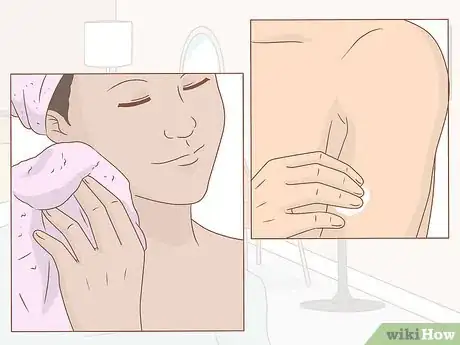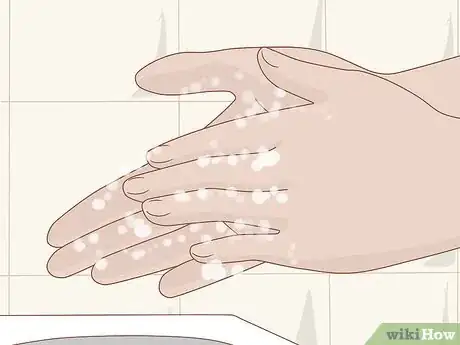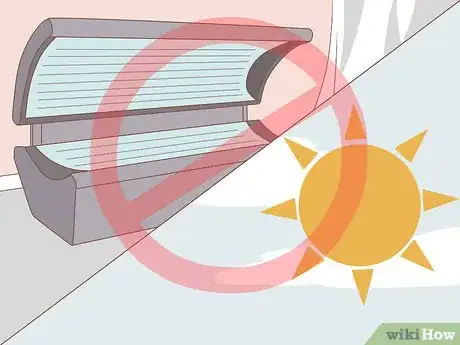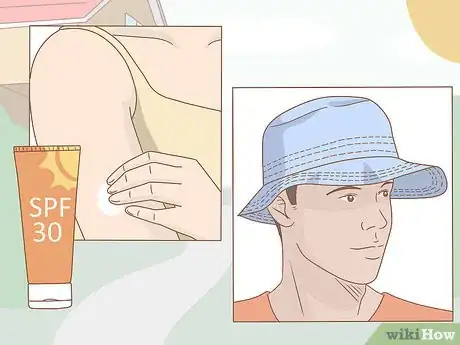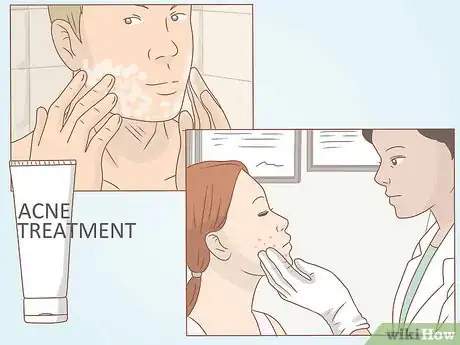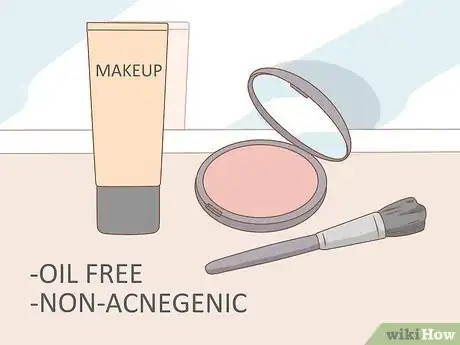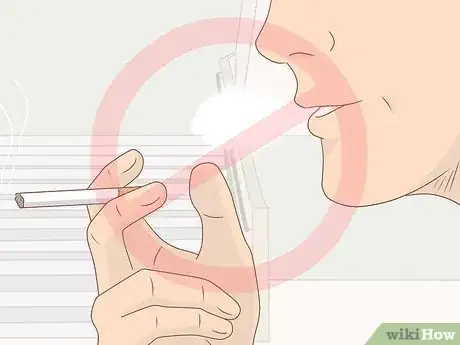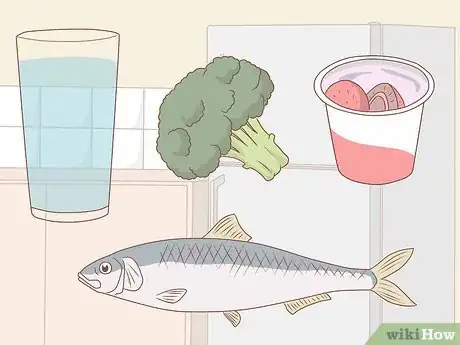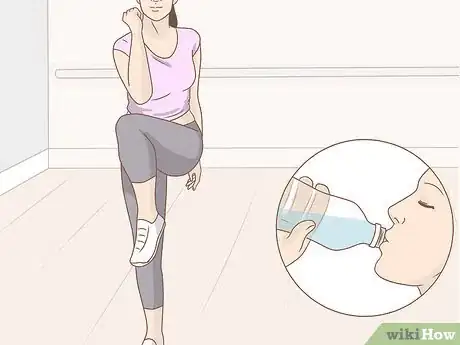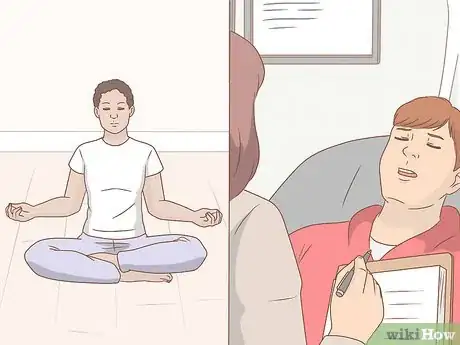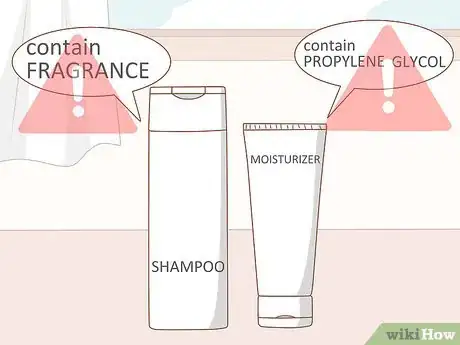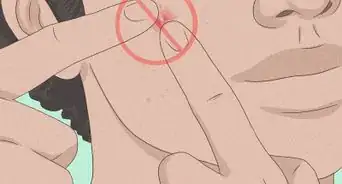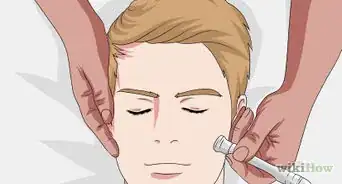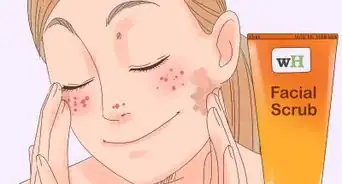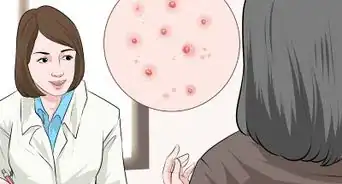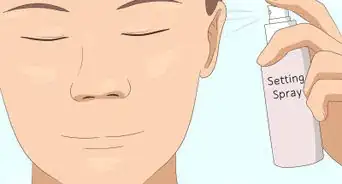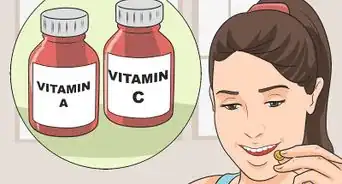This article was co-authored by Laura Marusinec, MD. Dr. Marusinec is a board certified Pediatrician at the Children's Hospital of Wisconsin, where she is on the Clinical Practice Council. She received her M.D. from the Medical College of Wisconsin School of Medicine in 1995 and completed her residency at the Medical College of Wisconsin in Pediatrics in 1998. She is a member of the American Medical Writers Association and the Society for Pediatric Urgent Care.
There are 11 references cited in this article, which can be found at the bottom of the page.
This article has been viewed 88,779 times.
In large part because of the rapid hormonal changes they experience, teenagers are more prone to acne than adults. Therefore, many teens worry about the appearance of their skin. Caring for your skin and making a few easy lifestyle changes can help improve the look of your skin.
Steps
Caring For Your Skin
-
1Be gentle with your skin. The key to healthy skin is treating your skin well. Be gentle when caring for you skin. This will improve its appearance and reduce the risk of skin problems in the future.
- Limit the time you spend showering or bathing. Overexposure to water can dry out skin and cause damage. Try to take warm, rather than hot, showers and baths.[1]
- Avoid harsh soaps. Strongly acidic soaps and detergents can dry out skin and remove oils. Stick to mild cleansers without many added ingredients and chemicals.[2]
- Pat your skin dry with a towel after bathing. This allows moisture to remain on your skin. Rubbing can dry out and irritate skin.[3]
- Moisturize. Get a mild, non-scented daily moisturizer and use it after showers and exercise and also before bed if the weather is dry or cold or if your skin tends to get dry. Pick a brand that contains SPF for added protection against the sun for daytime hours.[4]
-
2Wash your hands regularly. Keeping your hands clean can help with your skin. Touching your face when you have bacteria on your hands can cause acne to develop.
- Wet your hands with clean water and add soap. Lather your hands and then scrub for about 20 seconds. It can help to hum the "Happy Birthday" song twice to keep track of time. Make sure to wash between your fingers, under your fingernails, and the backs of your hands.[5]
- Rinse your hands under clean, running water and then dry them with a towel.[6]
Advertisement -
3Stay away from tanning. Tanning beds are dangerous for skin, especially vulnerable teenage skin. Some states and countries have even banned the use of tanning beds by people under 18.[7] Tanning using natural sunlight can also increase your risk of a variety of skin conditions, including melanoma (skin cancer) and premature skin aging. If you want to improve the look of your skin, consider spray-on tan or tinted moisturizers.[8]
-
4Protect yourself from the sun. If you're out in the sun, make sure your skin is protected. Overexposure to sunlight increases your risk of cancer and can cause other skin problems with time.
- Use sunscreen. Look for a brand of at least SPF 30. If you're going to be out in the sun for a day, reapply sunscreen every two hours.[9]
- Sunlight is most damaging between 10 a.m. and 2 p.m. During this timeframe, seek shade and wear protective clothing like hats, scarves, and long-sleeved shirts.[10]
-
5Treat acne. If you're prone to acne breakouts, figure out how to treat them effectively. You may have to experiment with several different types of acne products before you find the brand most effective for you.
- When considering treatment options, talk to your doctor or dermatologist. They can recommend an over-the-counter cream or prescription medications considering your skin type and medical history. You may need to try several different products before you find one that's effective for you.[11]
- Certain lifestyle changes can help with acne as well. Try to wear less makeup during breakouts, as this can lengthen their duration. Always wash your face after exercise. Try to avoid having your hair, hats, or clothing come into contact with your face as this can trap sweat leading to breakouts. You should never pop pimples or pick at zits. This can cause scarring.[12]
-
6Choose the right makeups. Look for brands of make-up that are light, oil-free, and claim to be non-comedogenic or non-acnegenic, meaning they won't contribute to breakouts. Mineral-based and water-based makeups tend to be better for acne-prone skin. You should also wash makeup off at the end of the day, before bed, or before exercise. This reduces the risk of makeup clogging your pores. Wash your hands before applying makeup and store application brushes in safe, clean areas.
Making Lifestyle Changes
-
1
-
2Eat right. Your diet can affect the overall appearance of your skin. A healthy diet can also help wounds and scars to heal faster. Work on eating better if you want healthier, better looking skin.
- A diet rich in vitamin A, vitamin C, and zinc can help improve skin. Foods that include these vitamins and minerals include citrus fruits, strawberries, tomatoes, spinach, broccoli, cauliflower, cabbage, Brussels sprouts, fortified dairy products and cereals, red meats, seafood, and orange and yellow vegetables.[14]
- Get healthy proteins as this can also improve skin. Beans, eggs, milk, yogurt, tofu, soy products, and nuts are all excellent sources of protein.[15]
- Drink enough water. Many teens consume a lot of caffeinated beverages but don't get enough pure, plain water. Aim for between nine and 13 cups a day.[16]
-
3Exercise. Being physically active is actually good for your skin, just make sure you're cleansing your skin afterwards. It increases blood flow to the surface of your skin which allows nutrients to be better delivered throughout your body.
- Ideally, you should get one hour or more of physical activity most days of the week. This can help improve your skin. If you do not have the time or stamina to work out for a full hour, try breaking up physical activity into smaller chunks. Work for half an hour in the morning and then another half hour at night.[17]
- Always drink plenty of water when working out. This can help make up for the fluid lost during a workout.[18]
-
4Manage stress. Stress can affect your overall health, which includes your skin's appearance. If you're a high stress person, this can cause acne breakouts and other skin problems. Work on managing your stress load if you want healthy skin.
- Practice yoga or meditation. Both practices are designed to keep your mind in the present moment and can reduce overall stress. See if there are any yoga or meditation classes available in your area. You can also find guided yoga and meditation classes online.[19]
- If you have trouble managing stress, ask your parents to help you make an appointment with a therapist. A good therapist can help you find effective means to cope with anxiety and stress. Your general doctor should be able to find you a referral for a therapist in your area.[20]
-
5Stay away from irritants. Watch out for potential skin irritants. If you notice your skin breaks out or you develop rashes, try cutting out a skin product, make-up, shampoo, or lotion you use. If you notice a difference, this product might be damaging to your skin. Swap it out for another version.[21]
- Talk to your doctor or dermatologist about options for skin products if you think you are having reactions to certain products.
Warnings
- If your skin reacts badly to a product the first time you use it, it's best not to use it again. Odds are you'll get the same results the next time you use it. However, if a product just causes mild redness or dryness, use a little less and only use it every two to three days for the first two weeks to see if this helps. You can also apply a moisturizer after the product to reduce dryness.⧼thumbs_response⧽
References
- ↑ https://www.aad.org/dermatology-a-to-z/health-and-beauty/general-skin-care/dry-skin-tips
- ↑ http://www.mayoclinic.org/healthy-lifestyle/adult-health/in-depth/skin-care/art-20048237?pg=2
- ↑ http://www.mayoclinic.org/healthy-lifestyle/adult-health/in-depth/skin-care/art-20048237?pg=2
- ↑ http://www.mayoclinic.org/healthy-lifestyle/adult-health/in-depth/skin-care/art-20048237?pg=2
- ↑ http://www.cdc.gov/features/handwashing/
- ↑ http://www.cdc.gov/features/handwashing/
- ↑ http://www.ncsl.org/research/health/indoor-tanning-restrictions.aspx
- ↑ http://www.cdc.gov/cancer/skin/
- ↑ http://www.mayoclinic.org/healthy-lifestyle/adult-health/in-depth/skin-care/art-20048237?pg=1
- ↑ http://www.mayoclinic.org/healthy-lifestyle/adult-health/in-depth/skin-care/art-20048237?pg=1
- ↑ http://www.mayoclinic.org/diseases-conditions/acne/basics/treatment/con-20020580
- ↑ http://www.mayoclinic.org/diseases-conditions/acne/basics/lifestyle-home-remedies/con-20020580
- ↑ http://www.mayoclinic.org/healthy-lifestyle/adult-health/in-depth/skin-care/art-20048237?pg=1
- ↑ http://my.clevelandclinic.org/health/healthy_living/hic_Keeping_Your_Digestive_Tract_Healthy/hic_Nutrition_Guidelines_to_Improve_Wound_Healing
- ↑ http://my.clevelandclinic.org/health/healthy_living/hic_Keeping_Your_Digestive_Tract_Healthy/hic_Nutrition_Guidelines_to_Improve_Wound_Healing
- ↑ http://www.mayoclinic.org/healthy-lifestyle/nutrition-and-healthy-eating/in-depth/water/art-20044256
- ↑ http://www.niams.nih.gov/Health_Info/Kids/healthy_skin.asp#tabTwo
- ↑ http://www.niams.nih.gov/Health_Info/Kids/healthy_skin.asp#tabTwo
- ↑ http://www.mayoclinic.org/healthy-lifestyle/adult-health/in-depth/skin-care/art-20048237?pg=2
- ↑ http://www.mayoclinic.org/healthy-lifestyle/adult-health/in-depth/skin-care/art-20048237?pg=2
- ↑ http://www.mayoclinic.org/healthy-lifestyle/adult-health/in-depth/skin-care/art-20048237?pg=2
